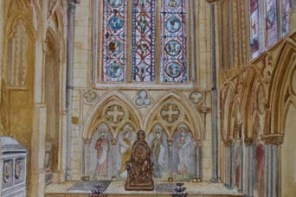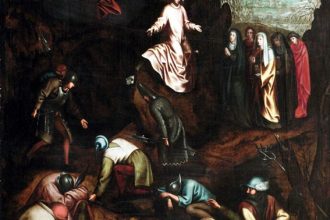 In Sarah Coakley’s new book, God, Sexuality, and the Self: An Essay ‘On the Trinity’, you may not expect a chapter devoted to devotional art, following a chapter of interviews with charismatic Anglicans on prayer, to help drive a thesis on sex. But it does. And to anyone who has read Augustine’s Confessions, or to any artist who has kept an honest journal for any length of time, the connection shouldn’t be so strange. It ought, in fact, to make a kind of strong, intuitive sense: sex, art, and relating to God are categories of experience which speak deeply to one another. Imagination and desire play out in our bodies, in our practices, in our histories. They are the rubber that always, always meets the road. And it is where the rubber meets the road that God meets us.
In Sarah Coakley’s new book, God, Sexuality, and the Self: An Essay ‘On the Trinity’, you may not expect a chapter devoted to devotional art, following a chapter of interviews with charismatic Anglicans on prayer, to help drive a thesis on sex. But it does. And to anyone who has read Augustine’s Confessions, or to any artist who has kept an honest journal for any length of time, the connection shouldn’t be so strange. It ought, in fact, to make a kind of strong, intuitive sense: sex, art, and relating to God are categories of experience which speak deeply to one another. Imagination and desire play out in our bodies, in our practices, in our histories. They are the rubber that always, always meets the road. And it is where the rubber meets the road that God meets us.
But along with Coakley and Augustine, I want to offer a third resource for reflection on the relationships between sex, art, and yearning for God: the spiritual autobiography of American graphic novelist Craig Thompson, entitled Blankets. There is much here to support Coakley’s research, as Thompson is working right in the middle of the mess and drama of his own desire, and like Augustine, finds that this is where the central struggle with God, self, memory, and communion really take place. But if Thompson intended his book to be a spiritual autobiography, I am not sure. His claims to Christianity are only prior claims—the book is in part about his leaving the church—and since his conservative Evangelical upbringing, he has had no active connection with Christianity. But a spiritual autobiography is exactly what he has produced, significantly, I think, in the form of a comic book, a piece of art. And this book has been important to many people I have known—writers, artists, seminarians, clergy, former Christians—in helping to name and visually recognize some of the deepest matrices of sexual and spiritual yearning in their own lives. It has done for them what many Sunday School classes, unfortunately, have not.
Blankets is so effective as a theological entry point because, like Augustine’s Confessions, it is the story of a life which illustrates, in often heartbreaking detail, a movement into and out of the Christian faith alongside a movement into and out of a first romance. It is about being a kid, a teenager, a young adult, and finding no place in God’s economy to draw pictures, to love a human Christ, or to be a desiring body. A dis-integrating, unconverted Christian gnosticism gets mistaken for the gospel: it’s a story easy to identify with and profoundly in need of telling–perhaps, not least, in a contemporary art form like the graphic novel.
I offer Thompson’s beautifully and sensitively illustrated struggles with God, with his artistic gifts, and with his sexuality, because I think it would make a great jumping-off point for reflection on Coakley’s research, either in the classroom or in a local church, and is a good place to fruitfully engage with both Christian and post-Christian confession into the 21st century. And for those with a vocation to theology, it can perhaps also help bring a sense of urgency to the academic and confessional task: Blankets shows how much bad theology hurts people. As an Evangelical American, every day I am surrounded by some spiritual fallout due to faulty theological connections (or lack thereof) between sexuality, imagination, and desire for God. It affects us on every level, from our understanding of the atonement, to how we date. And so it’s hard not to grieve for the real tragedies, struggles, and ecstasies for which Thompson’s Christian community gives him little or no resources. But the dogged vulnerability required to write such a book, and the skill to do it artfully, is a divine gift that any contemporary theological work, not least a good theology of desire, will never stop needing.
Amber Noel received her M.Div. from Duke University in 2012 after additional graduate coursework in theology and literature at Lee University. She lives in Durham, NC (USA) where she is exploring vocations in pastoral, artistic, and academic fields. In her spare time, Amber is either pursuing ordination as a deacon, eating breakfast, or watching Doctor Who. She has high-quality humans and/or cats around her most of the time.






Hi Amber,
“Blankets” is one of my favourites as well… I was just thinking about it the other day so this is serendipitous. It should be required reading for anyone interested in the (post)evangelical experience. Thanks for this.
BP